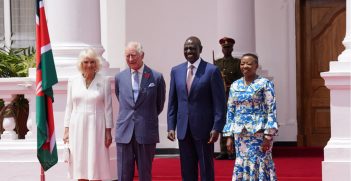The King's Coronation and Australia's Political Future

The coronation of King Charles III will undoubtedly reignite the question of whether Australia should become a republic. For what kind of a republic, and what political reforms will be needed, the experiences of Zimbabwe and South Africa provide lessons for what to avoid.
Many Australians with Republican tendencies have nursed the illusion that when Queen Elizabeth II died it would be easy to replace the monarchy with a republic. Yet, in just a few days time on the evening of Saturday, May 6 to be precise, wall-to-wall coverage on network television will remind them of the reality as Charles III and Queen Camilla are crowned in London. The prospect of an Australian as head of state is not happening anytime soon.
The service will be little changed from those of the previous 1,000 years. Just as the Archbishop of Canterbury placed the solid gold crown on the Queen’s head 71 years ago, his successor will place the crown on Charles’s head after he has sworn to serve God and the people. But at the request of the King, the service has been pared down; at just over 90 minutes, it will be an hour shorter than that in 1952, and the King will wear Army uniform, not the traditional silk breeches and gaiters. Only 2,000 people have invitations to Westminster Abbey, compared with 8,000 who attended Queen Elizabeth II’s service.
The biggest change involves religion. Since the Reformation, each monarch has vowed to uphold the Protestant faith of the Church of England in the ceremony. While Charles will still do that, at his insistence and with the agreement of the archbishop of Canterbury Justin Welby, “all the faiths” will be respected. Peers have been invited to represent the other four main faiths – Hindu, Jew, Muslim and Sikh – and present the king with four key pieces of coronation regalia.
For Australians, why does this matter? For many reasons. Etched in my memory is the sight of a furious prime minister Gough Whitlam addressing a crowd after being sacked by the governor general Sir John Kerr, proclaiming: “Well may we say, ‘God save the Queen’ because nobody will save the governor-general.” The Dismissal, one of the most shocking events in our nation’s history, led to a resurgence in an already building republican movement. Former prime minister John Howard called a referendum in 1999 in which no state supported a republic, although Victoria came close at 49 per cent. At that time, the monarchy in Britain was undergoing great stress, with the break-up of the marriage of the then Prince Charles and Diana, Princess of Wales. In an explosive television interview Diana had complained about a “third person” in the marriage, Camilla Parker Bowles. Then, in 1997, Diana died in a car accident in Paris; Charles married Camilla in 2005.
Charles, with Camilla’s help, has effectively rebuilt the monarchy’s popularity in Britain in the last 20 years, through energetic support of Queen Elizabeth II during the final years of her reign, his stewardship of royal holdings, and the continuing success of his Prince’s Trust which supports disadvantaged young people in the community. His personal life has been built around his privately owned home, Highgrove House in Gloucestershire, renowned for the gardens he has created there.
Contrary to public perception, royal palaces and Crown estates are national assets, not the personal property of the monarch. The late Queen owned Sandringham and Balmoral in her own right, though their current ownership is unknown because a monarch’s will is never published. One of his duties as Prince of Wales was to manage the royal Duchy of Cornwall, but he never owned it and required the permission of Treasury to acquire or dispose of any major holdings. In the last decade, the Duchy’s revenues have doubled to over £1 billion.
In the lead up to the coronation, speculation about the kind of king Charles will be has dominated the British press. Old stories of his more notable faux pas have resurfaced, such as when, on a visit to Canada, he was overheard comparing the Russian leader Vladimir Putin with Adolf Hitler. The Foreign Office went into overdrive and elsewhere there were calls for the prince to abdicate. Charles was right, of course, and while he has toned down his remarks more recently, there is little doubt that his deeply held views on the environment, sustainability, climate change, and other issues are closer to public opinion than those of some recent UK and Australian prime ministers. Not that King Charles can do much about it; you can almost feel his frustration as his country’s economy shrinks under the disaster of Brexit, and key institutions like the National Health Service, the police force, and the Confederation of British Industry are in decline.
It is clear that former prime minister Malcolm Turnbull made a mistake when he declared after the failure of the referendum in 1999, that we should wait for the death of Queen Elizabeth II before deciding whether Australia should become a republic. Elizabeth has gone and King Charles took her place within minutes. We should not wait until his passing before revisiting the issue of Australia as a republic.
Judging by recent polls, the Australian public has little appetite for change, even within the ruling Labor Party, which has committed itself to another referendum. Prime minister Anthony Albanese doesn’t see it as a priority. A junior minister has been appointed to work on it, but so far has provided little, if any, detail about what kind of republic is envisaged. If a referendum is to be taken seriously, there needs to be a society-wide debate.
The Commonwealth of Nations includes a number of countries that opted to be republics on independence but have not prospered. A prime example is Zimbabwe, which under the leadership of former freedom fighter Robert Mugabe, moved through democracy to autocracy. After the end of apartheid, the new South Africa got off to a bright start under Nelson Mandela but then Thabo Mbeke, his successor, turned out to be a weak leader and was replaced by the autocratic Jacob Zuma. The current president, Cyril Ramaphosa, a successful businessman, has struggled to contain corruption, crime, and social problems. More recently, there have been warning signs in the world’s largest democracy, India, where prime minister Narendra Modi is showing autocratic tendencies as well as deepening the country’s relationship with Putin’s Russia. And, beyond the Commonwealth, the unthinkable is happening as United States president Joe Biden tries to save the great American democracy from the potential threat of a return of the odious Donald Trump in the 2024 presidential election.
If Australians opt for the status quo and remain within the group of fifteen Commonwealth realms where King Charles is head of state, there is a need for reform. As in Canada, the constitution should be changed to ensure that the king has – neither in fact or by implication – absolutely no power over democratically-elected government. I would argue that the roles of governor-general and the governors of the states need to be abolished and replaced with offices in Canberra and state capitals, to keep the king informed about Australian public affairs and major issues, and to provide better links with the Commonwealth of Nations. And, if Australians opt for a republic, we had better be clear about what sort of president we wish to have. In my opinion, it would be a mistake simply to make the elected prime minister an elected president, and preferable to adopt a system such as that in Germany where a distinguished individual is chosen by both national and regional parliaments to be head of state, with limited powers. That should be the big debate in Canberra, and beyond.
Colin Chapman FAIIA is a writer, broadcaster, public speaker, who specialises in geopolitics, international economics, and global media issues. He is a former president of AIIA NSW and was appointed a fellow of the AIIA in 2017. Colin is editor at large with Australian Outlook.
This article is published under a Creative Commons License and may be republished with attribution.





